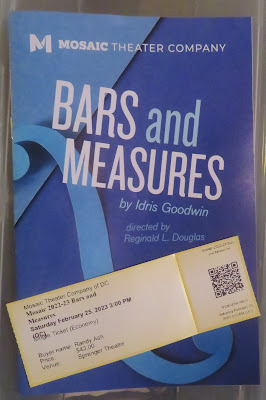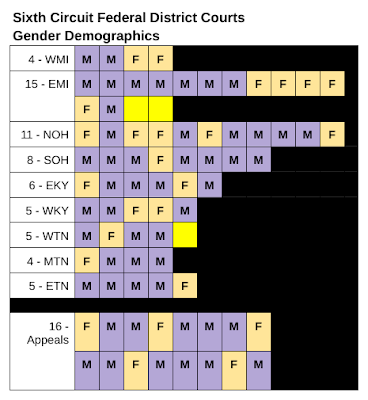"Bars & Measures" is the perfect example of what Mosaic Theatre in Washington, D.C. does when it does what it does best: Choose a play by a relatively new playwright that deals with complex cultural issues in non-linear ways that leaves the audience satisfied by a wonderful performance and yet stirred and unresolved with an experience that offers as many questions as answers. Catch your breath.
"Bars and Measures" is based on a real post-9/11 incident wherein the government infiltrated a mosque, sought out the most dissatisfied members of the community and then suggested a means to obtain justice illegally as a way to bait their marks. Then the arrests and the high profile trials meant to make the rest of us feel safer. It's not an easy subject, even now over 20 years removed. This story is about two bothers: Eric and Bilal. Eric loves classical music, Bilal is a well respected jazz musician. Eric remains with the culture of their childhood, Bilal converts to Islam. Bilal is arrested, and Eric stands by his brother visiting him in prison where Bilal attempts to convert Eric to the religion of jazz, all the while maintaining his innocence. At trial, the government's evidence up-turned the lives of both men and rents asunder the power of familial loyalties.
The set is a simple and effective one-piece with defined zones representing different places. The cast is made up of 4 actors, the two principle players and then two more who cover a handful of incidental characters. The most significant is Sylvia, a woman who comes to Eric to ask him to be her accompanist. She is a secular Muslim, and as the story exposes the fault lines between the brothers, Eric's actions also destroy the relationship he has come to have with Sylvia. The remaining supporting creative aspects of the production were good in that they were without distraction. In the end, isn't that what every good designer wants? To just be unnoticed.
To a person, the quartet of actors brought their talent and their A-game to the performances. As I mentioned over diner afterwards, they inhabited the characters so seamlessly, that I never doubted they were who they said they were. I don't know that there's a better compliment you can give.
And a word to the Pizzeria, Mozzeria, all of the front staff are deaf; maître'd, and wait staff. I first realized that the maître'd was deaf when we entered and asked for a table for four, his eyes locked on to the face of the person speaking and then quickly confirmed by sweeping his gaze nearly imperceptibly across our party, turning, he used his hand to bid us follow him. My first thought, and with Gallaudet University nearby, was "wow, he's deaf. How wonderful." The server arrived and announced her deafness to us. And that's when I mentioned that the maître'd was also deaf. Soon it became apparent that the entirety of the front staff was also deaf. I have to say, it was such a lovely experience. Deaf folk make up such a small percentage of our neighbors. Most of us never have a deaf friend. And when we do encounter them, they are like exotic foreigners with a secret language of the hands and silent lips. It's easy to fail to realize just how this single aspect of their lives is not the defining characteristic. In an environment where the presence of people who are deaf is normative, I suddenly gained a deeper appreciation and gratitude for the resilience and humanity of deaf folk. It may sound completely ridiculous, but I never before considered what agency for a deaf person navigating life in a aural world looked like. Shame on me.




















































